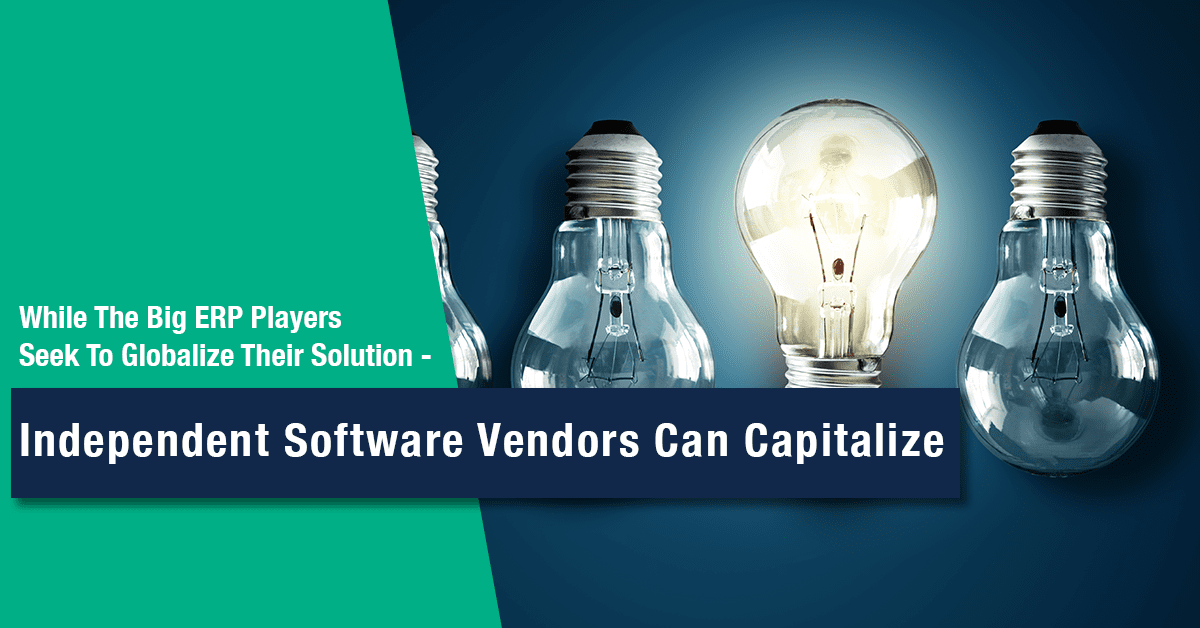
The future will be hyper-personalized – and that offers a strategic advantage for independent software vendors, who are primed to respond faster to market requirements than many of the large ERP providers. The latter built their empires on one-size-fits-all, broad functionality.
While that may no longer be the approach – even Oracle and SAP now offer significant customization – the time required for the big vendors to bring any new product to market or react to a customer request leaves a window of opportunity for any software vendor that can act fast.
Opportunities for personalized, local solutions are abundant. The software landscape is now so much more diverse and disruptive than before as vendors respond to the changing business landscape. ERPs were originally developed for manufacturing industries but now extend into finance, hospitality, healthcare and beyond.
They cover not just CRM, accounting and inventory management, but also payments processing, time tracking, and compliance. Customization and vertical-specific performance deliver a competitive edge for ERP clients. In fact, according to Forrester, the market for personalised ERP already stands at $15 billion.
Vertical or Local Expertise Matters
At the risk of portraying the Tier 1 ERP giants as secluded in their ivory towers, there’s little doubt that independent software vendors are more immersed in their niche markets. They are free to focus exclusively on what matters to their customers, without the noise and chaff of solutions that they don’t need for challenges they don’t have.
We’re beyond the stage when ERP solutions simply address core functionality. Even more so for the future, software is critical for business growth and IT is fundamental to operational efficiency. IT leaders no longer see their role as managing the infrastructure and fixing server downtime. The business needs them to capitalize on the value of IT and power up the bottom line through data analytics, automation and efficiency.
To a great extent, off-the-shelf software cannot provide that competitive advantage, not least because the competition is typically using the same platform. Enterprise-level ERP provides broad functionality across a big organisation, but as studies have shown, only around 20% of available functions are actually used.
That inefficiency can be absorbed in a large organization, but in a competitive niche market, it would be unacceptable. When just a 5% improvement can be enough to unlock a competitive advantage, there’s no room for redundant functions.
This then becomes a setting where independent software vendors can thrive. By being physically closer to their customers and more sophisticated in their sector expertise, they can hone their software to help their customers unlock a greater competitive advantage.
The Rise of Tailored ERP Solutions
The market size for vertical ERPs has tripled in the last decade. These software solutions apply a laser focus to functionality, delivering as close to 100% efficiency as possible. Typically, these solutions find favour in verticals with more intricate requirements than accounting and inventory, such as:
- Hospitality and catering ERPs which streamline inventory management, scheduling and training.
- Solutions that offer more robust compliance tools for heavily regulated industries, such as electrical and pharma.
- Construction industry ERP with powerful project management, bid packages and building management features to review drawings, plans and specs.
- Sales automation, CRM, document management, and compliance tools for insurance or legal professions.
Particularly in emerging verticals, there is a ‘winner takes all’ playing field to enter for any ERP solution that starts strongly. After that, buyers typically purchase what their competitors are using, one of the reasons why Veeva, for example, has a 60% market share in the pharma CRM vertical mentioned above.
Let’s look now to the future to see where independent software vendors can maximize their advantage by delivering the tools and features customers are going to be searching for.
Addressing niche vertical requirements
Customers are not crying out for an independent software vendor’s spin on the broad functionality already provided by say a White-Label ERP solution that might underpin a local solution. But they are looking for the supplementary functions that can be integrated with them and the industry insights to extract optimum value from the solution.
In that respect, there is an argument for trusting the performance of White-Label ERP solutions to take care of the ‘heavy lifting’. After all, they are rigorously designed and tested to do so. Independent software vendors can then augment that value by building the add-ons and customization that enhance the core product without impacting their customers upgrade path or the core code of their White-Label solution.
Efficiency through Automation
The defining value proposition of ERP has always been that it creates improved efficiency across processes within an organization, whether it’s replacing ad hoc data gathering with a centrally-shared database, or streamlining collaboration through permission-based sharing.
Now there’s the opportunity to eliminate human input (and error) from the process entirely – through automation. For about 60 percent of occupations, at least one-third of tasks could be fully automated, saving time and mitigating risk. Take away the 2 to 3 days on average that a business might spend doing a stock take and replace it with a 9-10 hour procedure when the right system and processes are in place.
If businesses are looking to unlock the potential of high levels of automation, who is better placed to be first with a solution? It has to be the independent software vendor with an industry-specific solution and sector expertise that can customize a solution fast for each vertical or location.
This is compounded by the level of code-free customization options a White-Label ERP platform affords local software houses. Through the use of agile features related to the creation of custom properties, workflows, rules, alerts etc. these onsite bespoke customizations can be executed by the local software house with zero involvement from the White-Label ERP vendor. This gives the independent software vendor a huge level of autonomy to satisfy their customer requirements quickly and cost-effectively.
For those merchant, retail and wholesale/distribution businesses that are crying out for a solution that unlocks the potential of Machine Learning and AI to power, for example, the smart warehouse that runs 24/7 and sets its own predictive maintenance schedule – will they find that solution from a Tier 1 ERP? Most probably not. But the spoils are significant for any software vendor that can respond.
As Yagmur Sahin says in ERP News, “Machine Learning and AI can take ERP from a functional role in business growth to a fundamental one.”
The ERP solution of the future is one that will integrate everything from AI-enabled chatbots to mobile apps supported by REST APIs that meet the specific requirements of each business.
Mobile capability
The shift towards mobile devices to empower remote or partner teams was already well underway before the pandemic made remote working the default setting. At this juncture, local software solutions are better poised to address the flexibility and agility of tomorrow’s workforce and business requirements than the big ERP platforms, even if they may lack the resources to build and develop mobile apps.
But today’s worker (let alone tomorrow’s) is not anchored to a single desk, inputting data when back in the office, waiting for the end-of-month reports to come in before planning and forecasting their next moves. Instead, they are hopping between locations, accessing data through desktop, laptop, mobile, tablet and even wearable technology, feeding back a stream of data into the system in the process.
They expect to be able to resolve issues and access data insights on the spot, whatever the location, and crucially they want the freedom to integrate a range of devices and platforms.
That requires a more sophisticated layer of integration and accessibility than many legacy off-the-shelf ERP platforms can provide – or were intended to allow. Built to more standardized processes, these platforms come across as cumbersome and archaic when applied to the challenges that tomorrow’s businesses are looking to solve. A White-Label ERP solution will get that legacy software vendor mobile! The cloud-born nature of the solution will give businesses the browser access they need but in addition, any white label ERP solution worth its salt will also come with a range of apps that extend the ERP solution out to mobile devices.
Cloud ERP
According to Gartner, more than half of large enterprises will use cloud ERP for core systems by 2025. For smaller or niche businesses, it’s often the only solution under consideration. Cloud ERP eliminates the vulnerability of hosted software, or the cost of hosted software licensing. It avoids the months or resources needed to migrate data from on-premise to a hybrid or cloud platform.
With a Cloud ERP solution, customized software providers can deliver a scalable, flexible yet powerful platform that can be tweaked or upgraded at the touch of a button, without taking servers offline or allocating significant developer support.
As with on-premise solutions, the suite of functions for most Cloud solutions can be extended or customized through a rules-based approach without having to modify code or threaten the integrity of the core code structure. From a storage perspective, it’s also a far more attractive proposition. Not only is there always a back-up in case of a crisis or security breach, but the business can scale according to growth by not having to carry the cost of surplus rack space or software licensing.
Small to medium businesses, in particular, are looking for predictable, manageable costs that they can scale in tune with their forecast growth. Although both off-the-shelf and Cloud ERP offer SaaS licensing models that can take the sting out of CapEx, one of the most common complaints with the bigger ERP platforms is that upgrades, maintenance and licensing is not transparent. Functions are either duplicated or redundant, with no clear timeline for when new versions will be issued.
Cloud ERP is, therefore, an option independent software vendors have to provide for their customers, and as these customers become more educated, masking hosted ERP as Cloud ERP simply won’t cut it anymore. Independent software vendors are likely to have some clients who want a browser-based ERP application, some who want desktop, and some who want a hybrid. The deployment infrastructure could be a mix of requirements also.
Rather than getting bogged down in building out this raft of options, a credible White-Label ERP solution will offer your business all of these options and more, leaving you to get on with what you do best: Building up your team to go beyond the hygiene factors and truly satisfy your customers’ needs.
In conclusion, it is important to reiterate that the distinction between ‘Big’ off-the-shelf ERP and customized solutions is more nuanced than a simple generic vs personalised debate. Many of the industry-leading ERP solutions do offer an impressive degree of customization.
But like waves crashing on a shore, they cover the broader expanses of sand first, whereas the customised ERP providers are already among the inner reaches and pools. In the same way, personalized White-Label ERP solutions have an advantage when it comes to meeting the specific needs of their verticals and local markets – and with the influx of new technologies into ERP, they go along way to enabling independent software vendors to put some distance between themselves and their competition.




